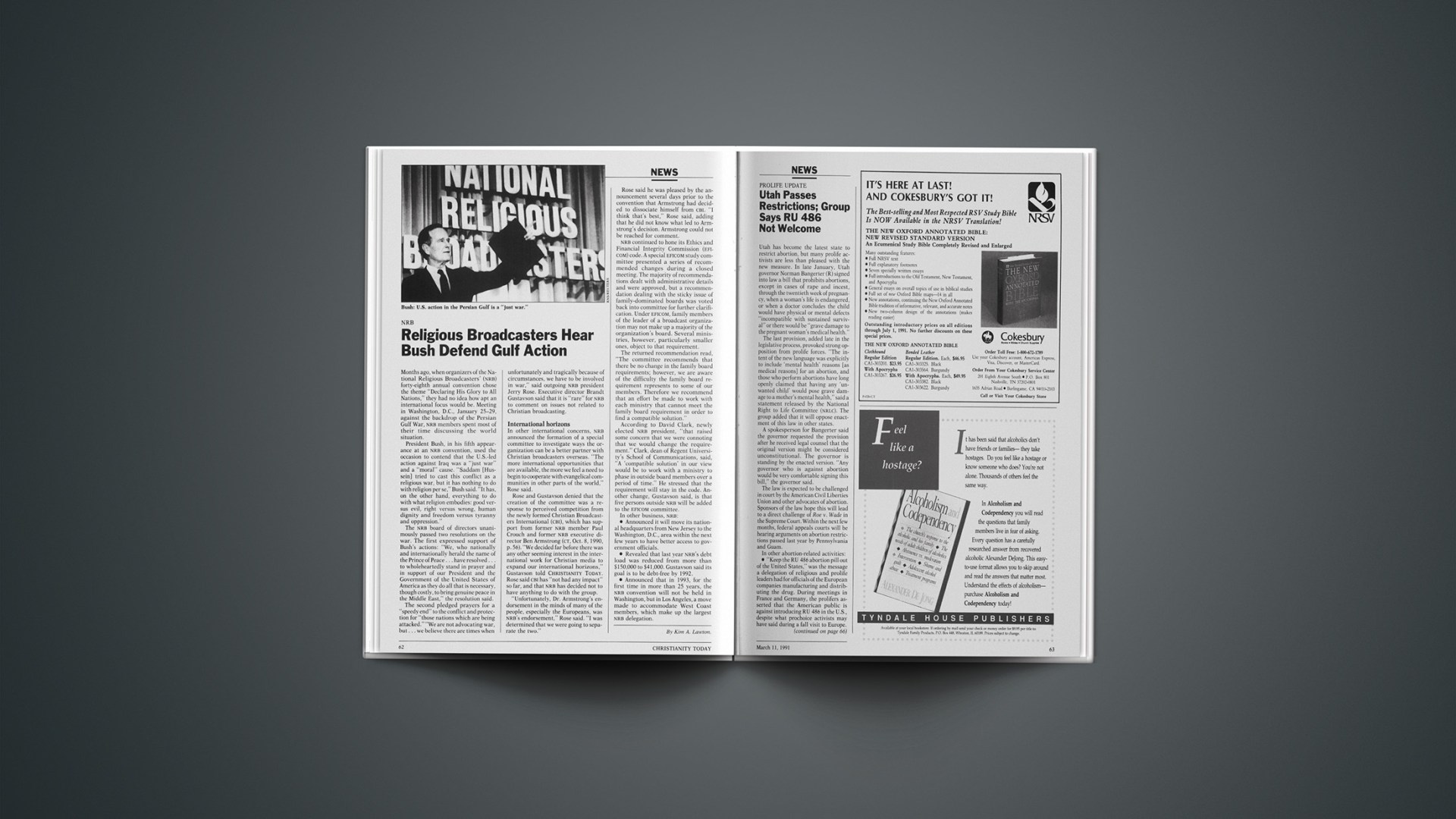Months ago, when organizers of the National Religious Broadcasters’ (NRB) forty-eighth annual convention chose the theme “Declaring His Glory to All Nations,” they had no idea how apt an international focus would be. Meeting in Washington, D.C., January 25–29, against the backdrop of the Persian Gulf War, NRB members spent most of their time discussing the world situation.
President Bush, in his fifth appearance at an NRB convention, used the occasion to contend that the U.S.-led action against Iraq was a “just war” and a “moral” cause. “Saddam [Hussein] tried to cast this conflict as a religious war, but it has nothing to do with religion per se,” Bush said. “It has, on the other hand, everything to do with what religion embodies: good versus evil, right versus wrong, human dignity and freedom versus tyranny and oppression.”
The NRB board of directors unanimously passed two resolutions on the war. The first expressed support of Bush’s actions: “We, who nationally and internationally herald the name of the Prince of Peace … have resolved … to wholeheartedly stand in prayer and in support of our President and the Government of the United States of America as they do all that is necessary, though costly, to bring genuine peace in the Middle East,” the resolution said.
The second pledged prayers for a “speedy end” to the conflict and protection for “those nations which are being attacked.” “We are not advocating war, but … we believe there are times when unfortunately and tragically because of circumstances, we have to be involved in war,” said outgoing NRB president Jerry Rose. Executive director Brandt Gustavson said that it is “rare” for NRB to comment on issues not related to Christian broadcasting.
International Horizons
In other international concerns, NRB announced the formation of a special committee to investigate ways the organization can be a better partner with Christian broadcasters overseas. “The more international opportunities that are available, the more we feel a need to begin to cooperate with evangelical communities in other parts of the world,” Rose said.
Rose and Gustavson denied that the creation of the committee was a response to perceived competition from the newly formed Christian Broadcasters International (CBI), which has support from former NRB member Paul Crouch and former NRB executive director Ben Armstrong (CT, Oct. 8, 1990, p. 56). “We decided far before there was any other seeming interest in the international work for Christian media to expand our international horizons,” Gustavson told CHRISTIANITY TODAY. Rose said CBI has “not had any impact” so far, and that NRB has decided not to have anything to do with the group.
“Unfortunately, Dr. Armstrong’s endorsement in the minds of many of the people, especially the Europeans, was NRB’s endorsement,” Rose said. “I was determined that we were going to separate the two.”
Rose said he was pleased by the announcement several days prior to the convention that Armstrong had decided to dissociate himself from CBI. “I think that’s best,” Rose said, adding that he did not know what led to Armstrong’s decision. Armstrong could not be reached for comment.
NRB continued to hone its Ethics and Financial Integrity Commission (EFICOM) code. A special EFICOM study committee presented a series of recommended changes during a closed meeting. The majority of recommendations dealt with administrative details and were approved, but a recommendation dealing with the sticky issue of family-dominated boards was voted back into committee for further clarification. Under EFICOM, family members of the leader of a broadcast organization may not make up a majority of the organization’s board. Several ministries, however, particularly smaller ones, object to that requirement.
The returned recommendation read, “The committee recommends that there be no change in the family board requirements; however, we are aware of the difficulty the family board requirement represents to some of our members. Therefore we recommend that an effort be made to work with each ministry that cannot meet the family board requirement in order to find a compatible solution.”
According to David Clark, newly elected NRB president, “that raised some concern that we were connoting that we would change the requirement.” Clark, dean of Regent University’s School of Communications, said, “A ‘compatible solution’ in our view would be to work with a ministry to phase in outside board members over a period of time.” He stressed that the requirement will stay in the code. Another change, Gustavson said, is that five persons outside NRB will be added to the EFICOM committee.
In other business, NRB:
• Announced it will move its national headquarters from New Jersey to the Washington, D.C., area within the next few years to have better access to government officials.
• Revealed that last year NRB’s debt load was reduced from more than $150,000 to $41,000. Gustavson said its goal is to be debt-free by 1992.
• Announced that in 1993, for the first time in more than 25 years, the NRB convention will not be held in Washington, but in Los Angeles, a move made to accommodate West Coast members, which make up the largest NRB delegation.










